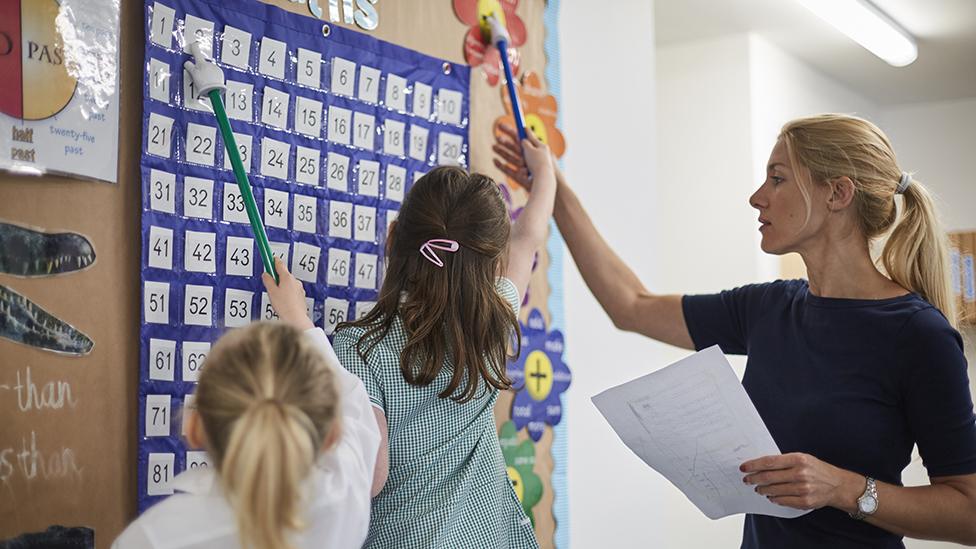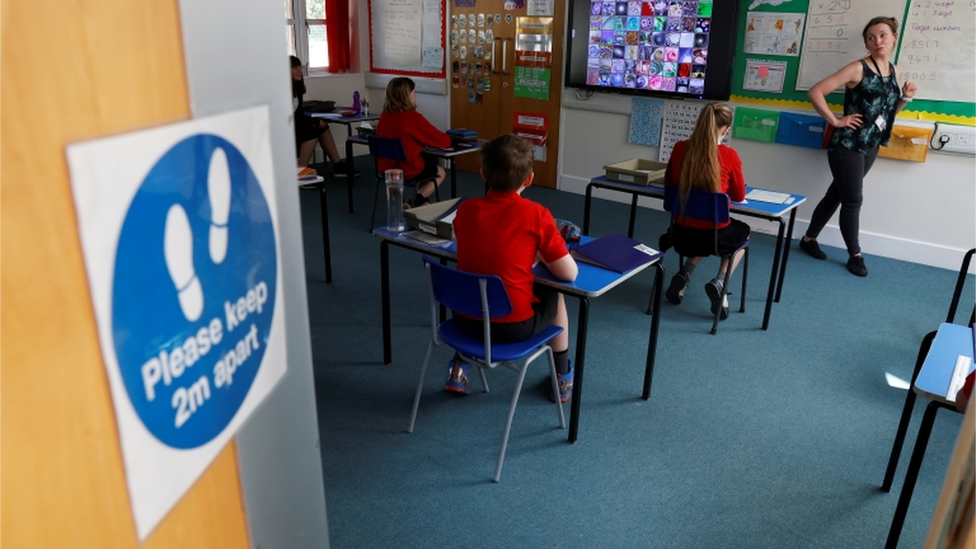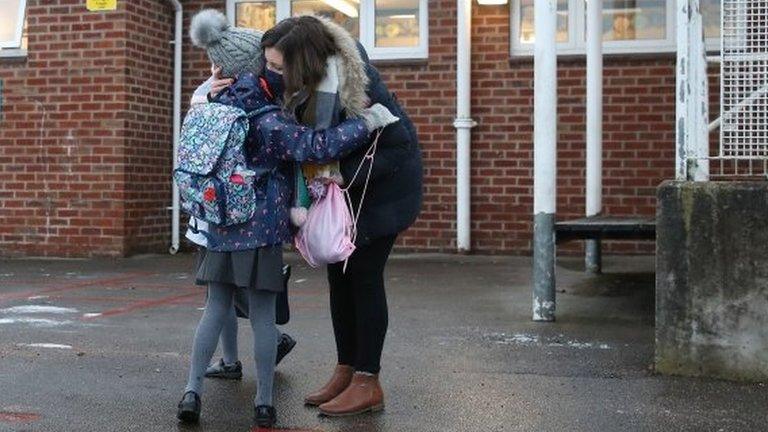Boris Johnson promises more school catch-up cash in 'damp squib' row
- Published
- comments
PM Boris Johnson says there will be more funding coming "down the track"
The prime minister has promised schools in England there will be more money "coming down the track" after catch-up plans were labelled a "damp squib".
Head teachers had said they were "hugely disappointed" by a £1.4bn Covid recovery package, which breaks down to £50 extra per pupil per year.
Most of the funding will be for tutoring to make up for lost learning.
Boris Johnson said it would "give parents the confidence" that their children would be supported.
But the plans so far are much more limited than the £13.5bn that the Education Policy Institute (EPI) think tank had calculated would be required to catch up on lessons disrupted by the pandemic.
Tutor sessions
The catch-up plan, with £1.4bn extra over three years in addition to the £1.7bn already announced, will include £1bn for 100 million hours of tutoring and £250m for teacher training and development.
Tutoring, often in small groups, will be targeted at those considered most in need of support, particularly the disadvantaged and will not available for all pupils.
The EPI, which warned primary pupils had lost up to two months of learning in reading and three months in maths, said the extra funding amounted to £50 per pupil per year - a tenth of what it estimated was needed.
Spread over three years, the extra cash is worth about 1% of the annual schools budget, said the EPI.
The support was lower than in other countries, said the think tank, with catch-up funding in England, including earlier announcements, worth £310 per pupil over three years, compared with £1,600 in the United States and £2,500 in the Netherlands.

Parent's view: 'The day is long enough'
Elizabeth, a mother of two from Worcester, welcomed the idea of more help for children in class.
"I want children to be supported in school and extra teachers - and the children split into smaller groups with additional classroom support is always going to be a good thing."
But she does not want children to be put under too much pressure.
"We don't want to cram in the curriculum, we want children to enjoy learning and not put pressure on pupils or teachers to do more in the school day.
"For my children, the day is long enough - five days a week 9am to 3.30pm. They come home and they are knackered, particularly my eldest who has started high school - there is so much for him to take in and absorb.
"If the day was extended to 4.30pm they would come home, have their tea, do their homework and there would be very little down-time.
"I did read some of the plans may have included after-school clubs like music, that's a good thing but not to do more curriculum learning."

There had been reports the recovery plan would be much bigger and include a longer school day - but funding for any further catch-up proposals will now depend on the next spending review.
But Education Secretary Gavin Williamson told BBC Radio 4's Today programme that an extended school day was "very much still on the agenda".
Education Secretary Gavin Williamson: 'Strong case' for longer school days
Asked whether the funding was less than required, Mr Williamson said the catch-up plan was based on the evidence of what works - and that tutoring "does actually deliver" and should not be the "preserve of a few".
He said the £1.4bn was a "pretty hefty amount" and would "have a direct impact on children".
Suggestions of shorter summer holidays were no longer being considered, said the education secretary.


At St Wilfrid's in Crawley students had wanted more "certainty" rather than longer hours and extra initiatives
Pupils' view: 'End the uncertainty'
The hesitation over plans for an extended school day would not have been seen as much as a loss to sixth formers at St Wilfrid's Catholic school in Crawley, West Sussex.
They wanted a return to normality and "certainty" after so much upheaval, rather than adding extra hours, which could leave students tired rather than inspired.
"It feels like the pandemic has been constant pressure and uncertainty," said Katelan, a Year 12 student.
"The most important thing the government could give us as students is clarity. And clarity early on and not just a few months before we're due to take the exams," says Catherine, expecting to take her A-levels next summer.
The pupils were "delighted" to be back in the classroom in March, rather than relying on online lessons - and if tutoring is going to be provided they want it to be in-person rather than online.

'Catch-up tsar'
The BBC has learned a much bigger and more ambitious plan costing just over £10bn was still under discussion between government departments as recently as last week, but this was rejected by the Treasury.
Sources close to the talks said the Treasury was reluctant to sign off on such a big upfront commitment.
In response, a Whitehall source said: "It's right for both children and the taxpayer that we know what we're buying before we spend."
The education recovery tsar, Sir Kevan Collins, had previously talked of the importance of extra teaching hours, including for sports, music and the arts.
There were reports he had proposed a £15bn recovery package, but he said the tutoring and teacher training announced represented "evidence-based support to a significant number of our children and teachers".
But Sir Kevan added that "more will be needed to meet the scale of the challenge."
'Funding battle'
Geoff Barton, leader of the ASCL head teachers' union, said the government's response was "hugely disappointing" and "shows a failure to recognise the scale of learning loss".
"There has obviously been a battle behind the scenes over funding for education recovery," said Mr Barton - with a settlement much lower than anticipated.

There have been warnings that pupils had slipped back in maths and reading
"Where is the funding for drama and music, sport and skills development?" asked Mary Bousted, co-leader of the National Education Union, who added: "Rarely has so much been promised and so little delivered."
Paul Whiteman, leader of the National Association of Head Teachers, said the announcement was a "damp squib" and "education recovery cannot be done on the cheap".
But the heads' union leader welcomed that there was no plan to extend the school day, which could have caused "more harm than good".
Labour's Education Secretary Kate Green said the announcement "makes a mockery of the prime minister's claim that education is a priority".
Labour's recovery proposals included breakfast clubs and mental health support, as well as tutoring and teacher development.


This is not a plan on the scale anyone imagined when the prime minister appointed an adviser, Sir Kevan Collins, to shape bold recovery ideas for England's schools.
In February, Sir Kevan told me in his first interview a broad vision was urgently needed.
From the outset he made clear schools might need extra hours, not just for learning but for sport, music and other activities pupils have missed.
People close to the government talks said that even last week the plans being discussed were ambitious, costing more than £10bn.
But the Treasury, according to these sources, baulked at the cost and honed in on core funding for tutoring which is backed by research evidence.
Schools it seems will have to take their chances, alongside other priorities, in the big spending review this autumn.


Will extra tutoring help your child? What do you think of plans to not have a longer school day? Email haveyoursay@bbc.co.uk, external
WhatsApp: +44 7756 165803, external
Tweet: @BBC_HaveYourSay, external
Please read our terms & conditions and privacy policy


A SIMPLE GUIDE: How do I protect myself?
AVOIDING CONTACT: The rules on self-isolation and exercise
WHAT WE DON'T KNOW How to understand the death toll
LOOK-UP TOOL: Check cases in your area


DO BLACK LIVES STILL MATTER?: Investigating what's really changed one year after the death of George Floyd
ARE YOU SCARED YET?: Panorama investigates how AI has changed our world and the risks that come with it

- Published1 June 2021

- Published13 May 2021

- Published7 March 2021
